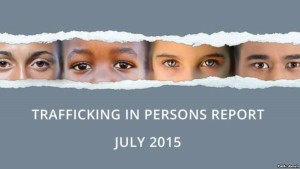 The just released US State Department 2015 report on slavery and human trafficking in the world ranks Algeria at the bottom of the standings while it notes that the situation in Morocco is improving.
The just released US State Department 2015 report on slavery and human trafficking in the world ranks Algeria at the bottom of the standings while it notes that the situation in Morocco is improving.
The report, entitled Trafficking in Persons Report 2015 , has ranked Algeria in the group of countries where such practices still exist and are even constantly progressing and where the ruling regimes do absolutely nothing to combat the plague.
Algeria is ranked in tier 3 like North Korea, Zimbabwe, Iran, Venezuela, Syria and Yemen and is at the bottom of world ranking among the 188 countries covered by the report.
Unlike the grim picture it gives of Algeria, the report underscores the gradual improvement of Morocco’s ranking and the efforts made by both the government and civil society to fight human trafficking under all its forms.
The US State Department accuses Algeria and the other countries in tier 3 of not meeting minimum international standards and of not doing enough in the fight against trafficking in human beings.
The report also notes the total indifference of Algerian authorities to the victims of slavery, of human trafficking and smuggling, and of sex trafficking mainly among illegal immigrants.
The case of Algeria is aggravated by the situation in the Tindouf refugee camps where the practice of slavery is commonplace, as evidenced by the documentary film “Stolen” directed secretly in the Tindouf camps by two Australians, Violeta Ayala (of Bolivian origin) and Dan Fallshaw.
The documentary film that was screened in several countries unveils the practice of slavery that is still widespread in the Tindouf camps, under the passive gaze of Algerian authorities.
During the film shooting, the two Australian activists were caught by the Polisario militia and thrown in jail although they had long supported the separatists’ thesis. They were released only after the international community exerted strong pressure on the Algerian regime.
Despite the tight surveillance they were subjected to, the documentary directors succeeded to smuggle out the film to Mauritania through a third person, making it possible for the world to see slavery victims and to hear their heartbreaking testimonies.